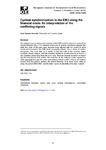Cyclical synchronization in the EMU along the financial crisis: An interpretation of the conflicting signals

View/
Use this link to cite
http://hdl.handle.net/2183/23339Collections
Metadata
Show full item recordTitle
Cyclical synchronization in the EMU along the financial crisis: An interpretation of the conflicting signalsAuthor(s)
Date
2012Citation
Cancelo, J. R. (2012). Cyclical synchronization in the EMU along the financial crisis: An interpretation of the conflicting signals. European Journal of Government and Economics, 1(1), 86-100. https://doi.org/10.17979/ejge.2012.1.1.4278
Abstract
[Abstract] We analyze how cyclical synchronization in the EMU evolved since the onset of the current financial crisis. The standard measures of cyclical correlation suggest that while the cycle of the euro area became more aligned with the cycles of other developed economies, the EMU itself apparently entered into a phase of cyclical divergence. We show that as a matter of fact the bulk of the member states remained closely aligned, and the seeming decline in synchronization is due to a few countries decoupling from the euro area. Next we present empirical evidence that the foundations that explain the evolution of the national cycles against the EMU aggregate through the crisis were already latent in 2007. Greece and Ireland deviate from the general pattern, the former because of its loose fiscal policy all along the period 2000-2007, and the latter due to the flexibility of its labor market
Keywords
International business cycles
Euro area
Cyclical convergence
Asymmetric responses
Euro area
Cyclical convergence
Asymmetric responses
Editor version
Rights
Atribución 4.0 España
ISSN
2254-7088






